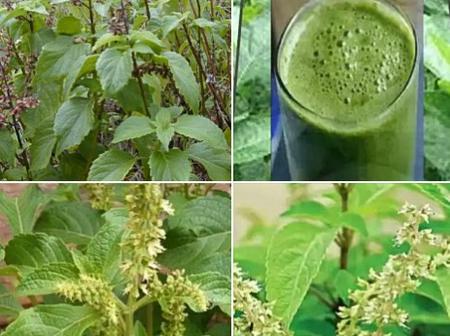The Scent leaves, botanically acknowledged as Ocimum gratissimum, is an aromatic herb that has been introduced significantly across tropical and subtropical areas of the world.
It is native to Nigeria, Ghana, Cameroun, Madagascar, Southern Asia, and the Bismarck Archipelago. It has been naturalized in nations such as Polynesia, Hawaii, Brazil, Panama, the West Indies, and Mexico.
The plant is usually a perennial homegrown shrub, although it can be determined in the wild, and is used typically as a spice for cooking food due to its fragrant taste.
Now, it is easy to disregard this plant as just any other sweet-smelling plant however it is extra than simply that.
The plant boasts a lot of antibacterial, antifungal, larvicidal, and antipyretic things to do that supply it a prominent position in the remedy and prevention of illnesses and infections.
Scent Leaves incorporate necessary bioactive materials which confer it with the above-mentioned things to do including; tannins, phenols, calcium, phosphorus, iron, diet A, and more, all of which are critical for human health.
Read Also: Ewedu Leaves (Jute Leaves): Facts, Health Benefits and Uses
Health Benefits of Scent Leaves (Ocimum gratissimum)

1. Maintenance of the eyes
Scent leaf is wealthy in Vitamin A, which promotes appropriate eyesight. Vitamin A is wished with the aid of the retina of the eyes in the form of retinal which combines with protein opsin to shape rhodopsin, the light-absorbing molecule which is subsequently fundamental for each scotopic imaginative and prescient (low-light) and coloration vision.
The deficiency of vitamin A can be horrible for the eyes leading to xerophthalmia (a scientific situation in which the eye fails to produce tears) and night blindness both of which are preventable when sufficient quantities of scent leaves are consumed.
Excess intake of nutrition A and with the aid of extension, the scent leaves, with the aid of pregnant girls can lead to delivery defects and is not recommended. Also, Information involving safety and efficacy in lactation is lacking.
2. Improves coronary heart function
Scent leaves incorporate calcium and magnesium, each of which help to reduce terrible ldl cholesterol (low-density lipoprotein cholesterol) and extend blood circulation.
Low-density lipoprotein (LDL) cholesterols expand the chance of Coronary Artery Disease in adults and so the consumption of scent leaves can reduce this ever-present risk.
Heart and artery issues resulting from the clogging of arteries are almost preventable if enough amounts of scent leaves are consumed.
3. Aids digestion
Scent leaves can assist relieve bloating and additionally help digest meals on time. Brewed scent leaves can have a calming effect on the belly and assist with bowel evacuation. Drinking scent leaves tea additionally relieves heartburn.
4. Lowers blood sugar
Scent leaves have an unprecedented potential to lower blood sugar and protect the pancreatic islets that produce insulin from damage.
A lookup study carried out on mice showed that scent leaves were efficacious in decreasing blood sugar levels.
Another randomized learn about equally confirmed a limit in blood sugar stages in Non-Insulin Dependent (NID) Diabetes Mellitus patients after consuming widespread quantities of scent leaves.
5. Insect and mosquito repellent
Scent leaves contain compounds like camphor, cineole, and limonene which are larvicidal and so are detrimental to mosquitoes or insects.
The leaves can be potted and left in residential quarters to serve as a repellent for houseflies, mosquitoes, and different insects.
This has a double function given that with the aid of decreasing the populace of mosquitoes and houseflies in residences, the incidences of malaria and enteric diseases (caused by houseflies) are each reduced.
Read Also: 28 Best Energy-Boosting Foods and Drinks
6. Treatment of fungal infections
Studies have shown scent leaves to have antifungal endeavor against Penicillium chrysogenum (also regarded as Penicillium notatum), Candida albicans, and Microsporeum gyseum.
Chloroform extracts from the leaves showed great antifungal activity against the fungal species mentioned.
Thus, scent leaves when overwhelmed and smeared on skin infections, help in its treatment.
7. Treatment of Diarrhea
Ethanol and hot water (100oC) extracts of scent leaves have been notably confirmed to be fine in opposition to some pathogenic bacteria known to reason diarrhea including Staphylococcus aureus, Escherichia coli, Shigella sp. and Salmonella sp.
It is consequently potential that scent leaves can be brewed as tea to treat instances of diarrhea induced by way of the above organisms.
Also, the use of scent leaves in the manage of diarrhea can be attributed to the relaxant motion of the necessary oil of O. gratissimum which is probably to be due to a direct effect on the easy muscle of the ileum as a substitute than an oblique motion on neurotransmitter release.
8. Anti-Inflammatory properties
Scent leaves have been proven to possess anti-inflammatory homes akin to pills such as aspirin and ibuprofen but are kinder to the inner linings of the stomach. Decoction made from leaves of O. Gratissimum is useful for restoration menstrual pain, belly ache, earache, and fever.
9. Treatment of respiratory disorders
Aqueous extracts of scent leaves have verified effects on markers of inflammation, together with interleukins, protein kinases, and leukocytes/eosinophils in fashions of respiratory allergy (in vitro experiments evaluating results on airway epithelial cells, in vivo studies in rodents) and for this reason can be used in managing respiratory problems.
The leaves are rubbed between the palms and sniffed as a cure for blocked nostrils.
10. Promotes oral hygiene
The stem of scent leaf when used as chewing stick kills bacteria in the mouth and help battle off bad breath. It is additionally in a position to stop enamel decay.
Tea made from the leaves of scent leaf can be taken as a tonic or used as a gargle to deal with sore throat.
Read Also: The 12 Best Foods and Drinks that are Good for the Liver
Was this article helpful? Share your thoughts and opinions in the comments section below.
